Forecasting
Failing to Forecast the Israeli-Palestinian Crisis
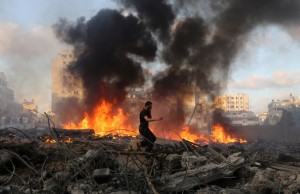 Charles Kurzman, “Failing to Forecast the Israeli-Palestinian Crisis,” The Washington Post’s Monkey Cage blog, July 29, 2014. “A month ago, three Israeli teenagers were found murdered near Hebron, presumably by Palestinians. Then a Palestinian teenager was found murdered in Jerusalem, presumably by Israelis. Within days, war had broken out between Hamas and Israel. Was this conflict predictable? In a general sense it can hardly be considered a surprise. But the timing of the conflict, sparked by murder and revenge – how could that be predicted?” More…
Charles Kurzman, “Failing to Forecast the Israeli-Palestinian Crisis,” The Washington Post’s Monkey Cage blog, July 29, 2014. “A month ago, three Israeli teenagers were found murdered near Hebron, presumably by Palestinians. Then a Palestinian teenager was found murdered in Jerusalem, presumably by Israelis. Within days, war had broken out between Hamas and Israel. Was this conflict predictable? In a general sense it can hardly be considered a surprise. But the timing of the conflict, sparked by murder and revenge – how could that be predicted?” More…
When Forecasts Fail
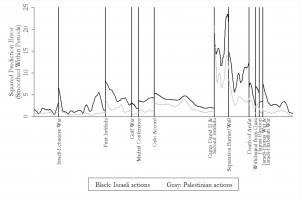
The Arab Spring Uncoiled
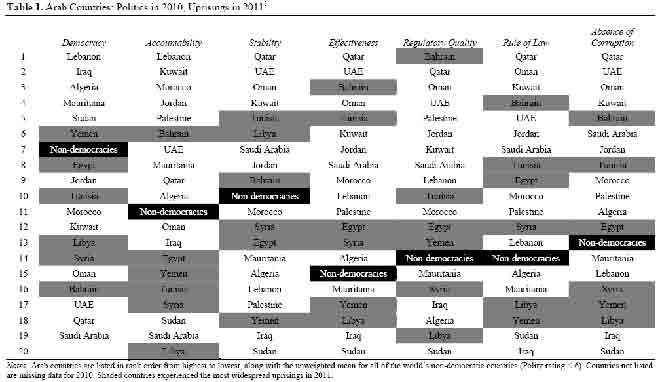 Charles Kurzman, “The Arab Spring Uncoiled,” Mobilization, Vol. 17, No. 4, December 2012, pp. 377-390. “Since the ‘Arab Spring’ emerged in the winter of 2011 … observers have rushed to explain mass revolts in the region. This introduction … reviews some of the explanations offered for these extraordinary events, and finds that the factors that are frequently cited in these explanations do not map comfortably onto the sites of greatest protest in the region. The essay then suggests an alternative approach, one that looks past causation in an attempt to understand the lived experience of the uprisings.” More…
Charles Kurzman, “The Arab Spring Uncoiled,” Mobilization, Vol. 17, No. 4, December 2012, pp. 377-390. “Since the ‘Arab Spring’ emerged in the winter of 2011 … observers have rushed to explain mass revolts in the region. This introduction … reviews some of the explanations offered for these extraordinary events, and finds that the factors that are frequently cited in these explanations do not map comfortably onto the sites of greatest protest in the region. The essay then suggests an alternative approach, one that looks past causation in an attempt to understand the lived experience of the uprisings.” More…
Ignore All the Iran Experts
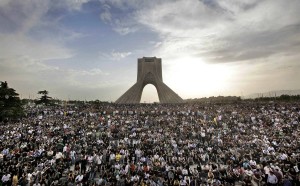 Charles Kurzman, “Ignore All the Iran Experts,” ForeignPolicy.com, June 17, 2009. “Troops are out in Iran this week, but in many cases the crowds have grown so large that the security forces are standing back and letting them swarm silently and peacefully through the boulevards — just like in 1978. … But the biggest similarity between the current protests and the Islamic revolution is the population’s widespread confusion about what comes next. In a year from now, people will look back on this week and say that what happened was inevitable. Whatever happens, they will predict the outcome retroactively.” More…
Charles Kurzman, “Ignore All the Iran Experts,” ForeignPolicy.com, June 17, 2009. “Troops are out in Iran this week, but in many cases the crowds have grown so large that the security forces are standing back and letting them swarm silently and peacefully through the boulevards — just like in 1978. … But the biggest similarity between the current protests and the Islamic revolution is the population’s widespread confusion about what comes next. In a year from now, people will look back on this week and say that what happened was inevitable. Whatever happens, they will predict the outcome retroactively.” More…
The Unthinkable Revolution in Iran
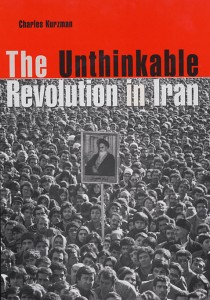 Charles Kurzman, The Unthinkable Revolution in Iran (Harvard University Press, 2004). (Persian translation of Chapter 1: فصل نخست.) “The shah of Iran, Mohammad Reza Pahlavi, would remain on the throne for the foreseeable future: This was the firm conclusion of a top-secret CIA analysis issued in October 1978. One hundred days later the shah — despite his massive military, fearsome security police, and superpower support — was overthrown by a popular and largely peaceful revolution.” More…
Charles Kurzman, The Unthinkable Revolution in Iran (Harvard University Press, 2004). (Persian translation of Chapter 1: فصل نخست.) “The shah of Iran, Mohammad Reza Pahlavi, would remain on the throne for the foreseeable future: This was the firm conclusion of a top-secret CIA analysis issued in October 1978. One hundred days later the shah — despite his massive military, fearsome security police, and superpower support — was overthrown by a popular and largely peaceful revolution.” More…